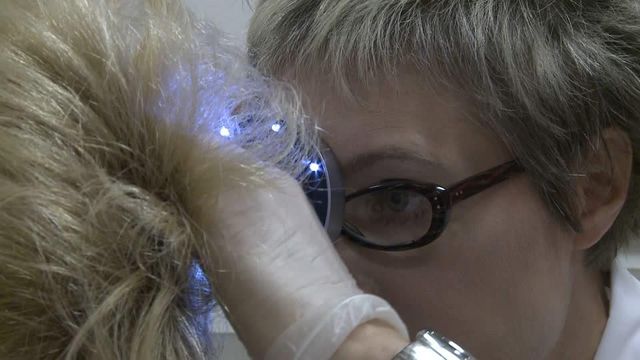Annual skin cancer screenings can help map changes
Although cancers inside the body get the majority of the attention, there are more newly-diagnosed cases of skin cancer than the incidence of lung, prostate, breast and colon cancers combined. Skin mapping with regular screening can help eliminate the threat.
Posted — UpdatedSkin mapping with regular screening can help eliminate the threat.
And even when people don't have the option of going to the doctor, the opportunity to be screened can come to them.
The Skin Cancer Foundation mobile unit made it easier for dozens of people recently at a free one-day screening, including 56-year-old Kris Laywer, who was able to get screened without seeing her dermatologist.
"She actually removed, a coupe of years ago, a small spot behind my thigh which I had never even known was there," Lawyer said.
In a scalp-to-toe exam, Carol Trakimas, of the Dermatology Center of Raleigh, sees things most people don't.
"It's very hard to check your scalp, very hard to check in the creases between your toes, your fingers, your back especially," Trakimas said. "You need a pair of professional eyes."
The American Academy of Dermatology recommends at least one cancer screening per year. A first exam, called skin mapping, is the basis for spotting changes. Trakimas said she looks for the ABCD's of skin cancer – assymetrical spots, border irregularity, color viability and diameter or changes in size – during every screening. She also looks for spots that aren't healing well or spots that ooze or crust over. All can be signs of cancer.
For Lawyer, an annual trip to see Trakimas is a necessity after her brush with skin cancer two years ago. Sunscreen is also a daily routine.
"I feel much more secure knowing that someone is looking for those types of things," Lawyer said.
At the recent one-day free screening event, 10 of the 70 people who came had pre-cancerous lesions. Nine people were found to have skin cancers, including three with melanmoa, the more serious form of skin cancer.
• Credits
Copyright 2024 by Capitol Broadcasting Company. All rights reserved. This material may not be published, broadcast, rewritten or redistributed.






